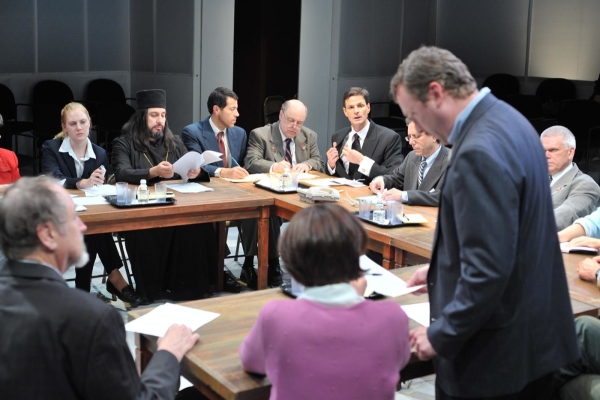The Shape of the Table (Cockpit Theatre)
‘A lucid, witty paradigm of what happened in the Velvet Revolution’

© Right Image Photography
In what feels like a great gesture of cultural goodwill, a small American theatre company – Burning Coal, based in North Carolina – has booked itself into the Cockpit off Lissom Grove to revive what they call David Edgar's Iron Curtain Trilogy.
The short two-week season marks the 25th anniversary of the fall of the Berlin Wall, the end of Communism, which might have proved a slightly inconvenient occurrence for a playwright of Edgar's political stamp. But he's far too clever and engaged an artist to have let that stop him ruminating on the consequences.
The Shape of the Table is a lucid, witty paradigm of what happened in the Velvet Revolution in Czechoslovakia in 1989; I was visiting Prague (and the banned, dissident theatre) earlier that year, Vaclav Havel was still in prison, and Edgar, who knows, was probably writing the first half of the play.
It's all talk and all set in a single room with a large table. The original National Theatre production clearly invoked the baroque castle palace with tall windows and gilded furniture; in the Cockpit, a single chandelier flickers above the suited jostling of factions, deal-making and Edgar's unrivalled ability to make committee-speak sound interesting.
There's the Havel figure's Public Platform party, the National Peasants party, the doomed Russian-approved prime minister and the weaselly new communications minister carving up the future while the crowds mass on the street outside and the old guard bite the bullets instead of firing them.
The first act closes with the surprise return of the Communist first secretary, a Dubcek-style reforming grandee, and then we see the tentative formation of a new government of national understanding, with concomitant fears of Americanisation – burgers and coca cola – homeless people in cardboard villages, the hint of a global video boom and cultural homogeneity. Did the country get "back to normal," are things better? Are they anywhere?
Jerome Davis's production – with smooth, supple performances from Marc Carver as the outgoing prime minister, Michael Kaplan, and Randolph Curtis Rand as the returning first secretary, Victor Spassov – lays out the play's arguments admirably, though the rearrangement of the rectangular table into a three-sided bare-boards conference facility causes blocking problems and too many backs to the fore.
Pavel Prus, the dissident writer, is given a febrile intensity by Brian Linden that sometimes suggests the whole play should have been about him. Instead, it's about the practical politics in the re-birth of democracy, that small thing; and more to come in the next two plays set in the Balkans and a newly independent post-Soviet government.












